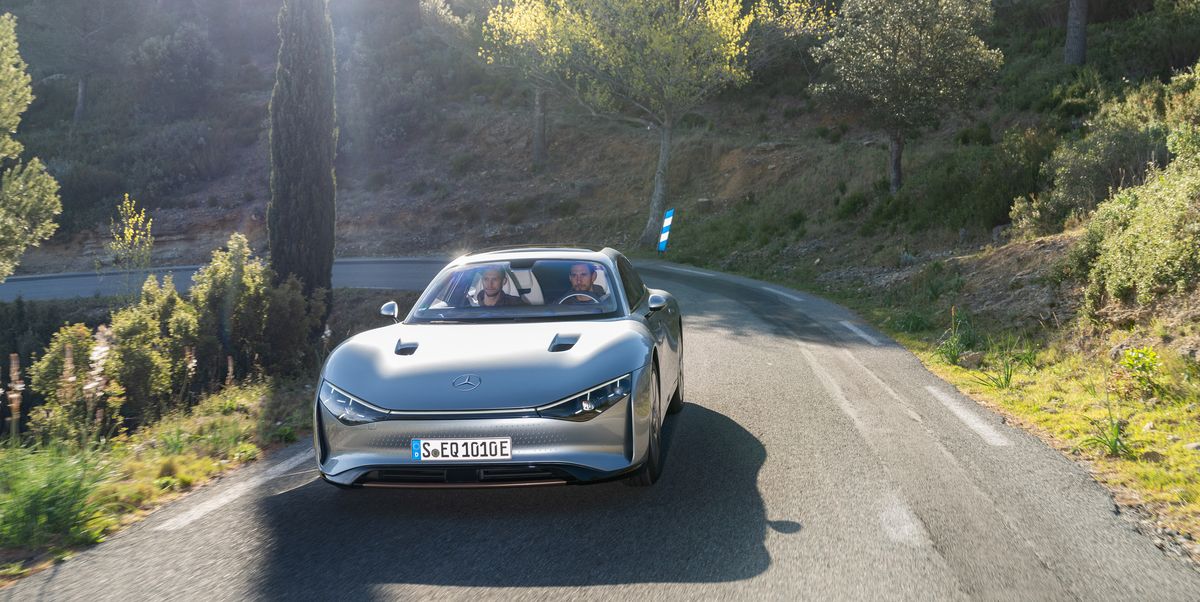Mercedes-Benz EQXX Shows It Can Go the Distance with 621-Mile Road Trip

Mercedes-Benz is rightly glorying in the fact that it drove its Vision EQXX battery-electric concept over 621 miles (1000 kilometers) on a single charge. The feat took place on real roads from Stuttgart, Germany, to Cassis, France, in early spring weather ranging from 37 to 64 degrees Fahrenheit, at an average speed of 53 miles per hour. That middling speed was no hypermiling; the route included autobahn stints with extensive cruising at up to 87 mph, offset by Europe’s congested urban traffic.
Mercedes pulled the caper with a 100.0-kWh battery that it claimed still contained 87 miles of range at the end of the trip. Compare that to the Lucid Air Grand Touring, which leads the North American pack in production EV range at an EPA-rated 516 miles thanks to a 112.0-kWh battery.
Hats off to Mercedes, then. But after spending a day with the Vision EQXX in Nice, France, we came away more impressed with the vehicle itself and what it could portend for the eldest and most conservative of German automakers. The Vision EQXX was created with some cool new development techniques and technologies that Mercedes said it’s determined to see into production.
The automaker believes “efficiency is the new currency” in an EV-focused world, so engineers relentlessly hunted aerodynamic and mechanical savings. The battery, developed in-house, weighs just 1091 pounds—37 percent of the weight of the 212.0-kWh battery in the 2022 GMC Hummer EV. The rear track is two inches narrower than the front track to keep the rear tires out of the airstream, an otherwise ungainly stance that is hidden by clever body design. The roof-mounted solar panel is fashioned from a lightweight composite. 3D-printed structural members improve strength while shedding weight. The active rear diffuser extends 7.8 inches at 37 miles per hour.
It’s a low, compact car we’d expect from a startup, not from S-class HQ, and likewise, the cabin is cozy and gorgeous. The interior brims with novel textures: mushroom- and cactus-based seating surfaces; shag carpet from bamboo fibers; 3D-printed metallic elements made from landfill waste.
A 48-inch screen doesn’t sit on the dash; it is the dash. Having just experienced Hyperscreen data onslaught in the 2023 EQE sedan, we marveled at how simply and intuitively the EQXX user experience team managed to present information on an even larger display.
Built with a game engine the company doesn’t want to publicize yet and employing real-time data, the infotainment system’s every page is full of cut-scene graphics that show what the EQXX is doing and experiencing at that moment. Turning the EQXX steering wheel turns the wheels on the EQXX display icon. The game engine takes data from four wind sensors on the sedan’s leading edge to create 360-degree airflow graphics during driving. The navigation map populates the area with real buildings, and it can remove buildings from the display to provide a clearer understanding of where the car is in relation to the destination.
We got a brief lap around Nice’s roads in the shotgun seat. On the go, there’s a slight edge to the tire noise reaching the cabin, but Mercedes hasn’t done any NVH fine-tuning yet; the specially developed Bridgestone tires contain no foam, for instance. The 201-hp electric motor moves the car’s 3858 pounds easily enough, but ultimate efficiency precludes EV theatrics. The display screen makes it a cinch to see where power is coming from and where it’s going. The bright, clear charts measure everything from rolling resistance to solar panel harvesting, and pop out a real-time coefficient-of-drag figure.
Before our day of workshops, we thought the Vision EQXX would be the kind of science project we’ve seen before. It would feature in little more than auto shows and future press releases that tout how the 2026 C-class’s windshield wiper arms incorporate some arcane polymer first developed for the EQXX.
That’s not the case. Mercedes runs its own Shark-Tank–style gatherings for startups, and the Vision EQXX is an example of what can be done when centuries of industrial might and know-how, as well as deep pockets, meet startup exploration and agility. We look forward to seeing its components make the move to production, and soon.
This content is imported from {embed-name}. You may be able to find the same content in another format, or you may be able to find more information, at their web site.
This content is created and maintained by a third party, and imported onto this page to help users provide their email addresses. You may be able to find more information about this and similar content at piano.io



